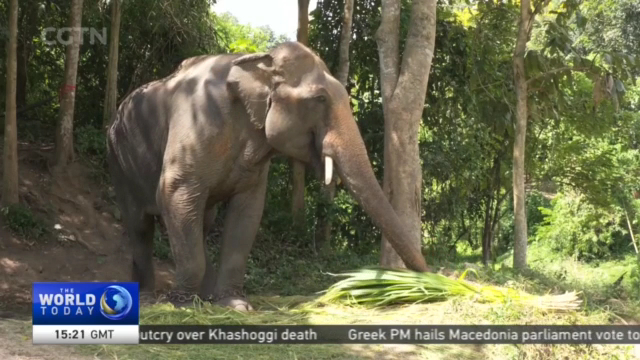
08:17, 22-Oct-2018
Travel-Free Ivory: WWF calls upon tourists to boycott ivory products
Updated
07:49, 25-Oct-2018
03:00

The world wildlife fund for nature, or WWF, recently launched a campaign, 'travel free ivory', to persuade tourists not to buy ivory. The campaign was launched in Thailand, which, despite international conventions, still permits the sale of domestic ivory. The WWF says that is allowing a huge trade in smuggled African ivory, and endangering the elephants which are being poached to feed the trade. Tony Cheng reports.
The sculpture of a dead elephant, lies in a pool of its own blood, in the center of downtown Bangkok. The elephant's young calf looks on with a tear in its eye. Around it are ivory trinkets of the sort popular with tourists keen to possess this material still associated with wealth, power and good luck. The installation is part of a new campaign from the World Wildlife Fund to persuade tourists not to buy ivory.
Twenty thousand African elephants are being killed every year by poachers driven by that trade, and according to the WWF, it's bringing the African elephant dangerous close to extinction.
GORDON HALL CONGDON CONSERVATION PROGRAM MANAGER, WWF THAILAND "Frankly Ivory is beautiful, it's a magnificent material to carve, but I think people need to realize that those traditions and those practices of using ivory have to stop, if not the elephant will disappear from the wild, and that would certainly be a tragedy."
This bust of illegal ivory was recently discovered in Malaysia, another popular market for tourist ivory sales. And while much ivory is discovered before it leaves Africa and destroyed, even more is still getting smuggled out. And Thailand, because of a loophole in the law, remains a significant market place.
TONY CHENG NORTHERN THAILAND "Although there have been international bans on ivory since 1990, Thailand does actually allow the sale of domestically produced ivory from animals that are sick or have died naturally. But that only produces 500 kg a year, and Thailand's actual stock at the moment is about ½ million kg."
The vast majority of Thailands elephants are employed in tourist attractions and zoos. Although these often attract the condemnation of animal rights groups, some say that exposing tourists to the majestic charms of living elephants is actually the best way to stop them wanting to buy ivory.
SOMCHART CHANGKARN, HEAD OF MAHOUT TRAINING CENTER THAILAND ELEPHANT CONSERVATION CENTER "When they get closer and touch them and feel and feed them, they feel they love the elephants, so they don't want to buy anything from the elephants, like the hair or the ivory."
And in Chiang Mai's famous night bazar, signs that things might finally be changing. Although images of elephants are everywhere ivory products that used to be prolific, appear to have disappeared. Tony Cheng CGTN Northern Thailand.

SITEMAP
Copyright © 2018 CGTN. Beijing ICP prepared NO.16065310-3
Copyright © 2018 CGTN. Beijing ICP prepared NO.16065310-3